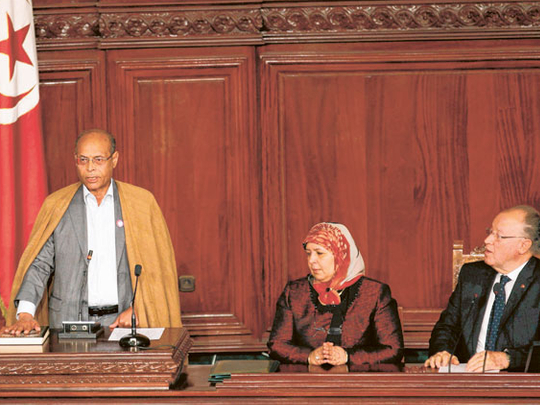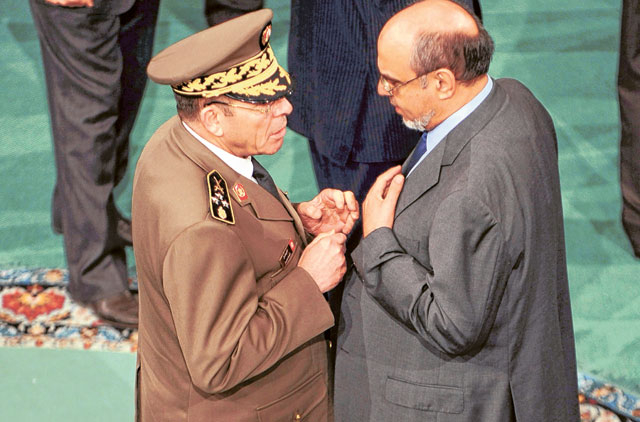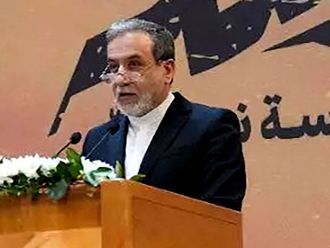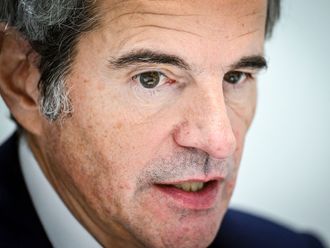
Manama: Tunisia's opposition veteran Munsif Al Marzouqi was sworn in on Tuesday as the country's first elected president since the north African nation's revolution sparked the Arab Spring.
"I will be the guarantor of the national interests, the state of laws and institutions," Al Marzouki said with his hand on the Quran as he took his oath before the constituent assembly that elected him president on Monday.
"I will be faithful to the martyrs and to the objectives of the revolution," he said, almost a year after the start of the mass protests that ousted strongman Zine Al Abidine Bin Ali and sparked popular revolts that also toppled dictators in Egypt and Libya. "Other nations are watching us as a laboratory of democracy," he said, clad in a traditional camel-coloured tunic on top of a white shirt and blue jacket. "The main challenge is to attain the revolution's goals."
Major task
On Monday, Al Marzouqi secured 153 votes in the 217-member assembly when he was elected president.
He was the only candidate running after eight applications were refused for not securing the support of at least 15 members of the assembly while one applicant was below the required age of 30 to run in the elections.
The opposition said it would cast white ballots to express its frustration with the process after there was an agreement between the ruling coalition to elect Al Marzouqi as Tunisia's new leader.
His major task will be to help cure a badly-hit economy, seriously harmed by a series of labour actions and a dramatic downfall in tourism resources.
Al Marzouqi's election comes two days after the assembly endorsed a set of temporary bylaws that will guide the country until a full constitution is drafted by the 217 members chosen on October 23 in the first true multi-party elections.
Al Nahda, the moderate Islamist party, dominated the elections, but chose to head the government in line with its ideology favouring a parliamentarian system of governance.
The party, winner of 89 seats, opted for a tripartite coalition with the first runner-up, the Congress for the Republic, and Attakatol, a centre left party that came fourth in the landmark elections.
The coalition agreed to nominate Mustafa Bin Jaafar, the leader of Attakatol, as the head of the constituent assembly and Al Marzouqi the leader of the Congress for the Republic as president of the North African nation. Under the deal, Al Nahda's secretary general, Hamadi Jabali, will be the prime minister with powers that exceed, for the first time in the country's history, those of the president.
Popular uprising
Tunisia has had three presidents since its independence from France on March 20, 1956.
Habib Bourguiba ruled the country from 1956 until 1987 when he was deposed in a bloodless coup by Zine Al Abidine Bin Ali.
A popular uprising that started on December 17 and culminated on January 14 resulted in Bin Ali fleeing Tunisia with his wife.
Fouad Mubazza was appointed interim president until the constituent assembly was formed to draft a constitution and choose a new leader.
Al Marzouqi, born in July 1945, is one of the best known human rights activists in Tunisia since 1980.
A medical doctor who graduated in 1980 from the University of Strasbourg, France, he later returned to Tunisia and was a professor of community medicine at the University of Sousse from 1981 until 2000.
He started his political and rights activism in 1980 after he joined the Tunisian League of Human Rights. In 1987, he was elected as deputy president of the league and in 1989 became the president of Africa's first human rights watchdog.
However, the league was dissolved in June 1992 after it opposed a new law on associations.
Al Marzouqi, determined not to be intimidated, set up in 1993 the national committee to defend opinion prisoners. The authorities immediately banned it, arguing it was illegal.
Even though the league was reinstated in 1993, Al Marzouki said that he was not interested in a position within the group.













